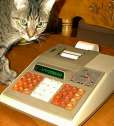Sharp EL-5100
| Datasheet legend
Ab/c:
Fractions calculation
AC: Alternating current BaseN: Number base calculations Card: Magnetic card storage Cmem: Continuous memory Cond: Conditional execution Const: Scientific constants Cplx: Complex number arithmetic DC: Direct current Eqlib: Equation library Exp: Exponential/logarithmic functions Fin: Financial functions Grph: Graphing capability Hyp: Hyperbolic functions Ind: Indirect addressing Intg: Numerical integration Jump: Unconditional jump (GOTO) Lbl: Program labels LCD: Liquid Crystal Display LED: Light-Emitting Diode Li-ion: Lithium-ion rechargeable battery Lreg: Linear regression (2-variable statistics) mA: Milliamperes of current Mtrx: Matrix support NiCd: Nickel-Cadmium rechargeable battery NiMH: Nickel-metal-hydrite rechargeable battery Prnt: Printer RTC: Real-time clock Sdev: Standard deviation (1-variable statistics) Solv: Equation solver Subr: Subroutine call capability Symb: Symbolic computing Tape: Magnetic tape storage Trig: Trigonometric functions Units: Unit conversions VAC: Volts AC VDC: Volts DC |
| ||||||||||||||||||||||||||||||||||||||||||||||||||||||||
Sharp EL-5100
 The Sharp EL-5100 is a vintage calculator with formula storage. Up to 5 simple algebraic formulae (80 steps in total length) can be stored and executed. The machine offers no branching or conditionals, so loops or iterative programs cannot be entered. Nevertheless, it's quite an interesting and useful beast; the one I just received was obviously much loved by its previous owner.
The Sharp EL-5100 is a vintage calculator with formula storage. Up to 5 simple algebraic formulae (80 steps in total length) can be stored and executed. The machine offers no branching or conditionals, so loops or iterative programs cannot be entered. Nevertheless, it's quite an interesting and useful beast; the one I just received was obviously much loved by its previous owner.
I have not yet tried shoehorning my favorite example, the Gamma function into this calculator's formula memory; thanks to ten registers that can be used to store constants, it just might be possible to enter an expression of that complexity. For now, here's an improved version of Stirling's formula, one which provides a very good approximation of the Gamma function for large arguments (and a reasonable approximation for small ones):
1;f(A)=√2π×AYx(A-.5)×e(1÷12A-A)


